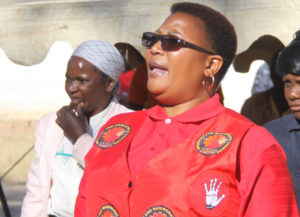
This is the time that the main opposition in Zimbabwe should be at its best, offering leadership, strategies and solutions to the multifaceted crisis, however, it is hamstrung by political bickering and personality clashes.
A pattern that continues to repeat itself, each time Zimbabweans are in desperate need of opposition leadership, an internal implosion occurs at the top, which throws the party into a state of confusion, compromising its ability to deliver change to its supporters and Zimbabweans at large.
That moment in history when the sheroes and heroes of our struggle should be rising and making a mark in the country’s unfolding politics, is being lost to an internecine warfare among factions of the main opposition party the MDC, as we knew it in 1999, now fighting from different corners and fractions.
A warfare Zanu PF according to character is taking full advantage of, one which I believe could have been avoided or at least mitigated, one which exposes some of the inherent weaknesses and vulnerabilities in the opposition which it needs to insulate itself against, if it is to survive the long haul to 2023.
The first concern is to do with moral leadership, what lessons can the MDC learn from the ‘struggles within the struggle’ during the war of liberation as documented by the late Masipula Sithole?
Sithole does not rule out the possibility of conflict in political organisations, however, he argues that what matters is how the leadership responds and handles the conflict.
Consequently, many begin to link internal party democratic processes or credentials as a reflection of the nature of politics an individual party will advance in national politics, charity they say begins at home. Humility, tolerance, forgiveness and political savvy in dealing with both internal and external challenges.
Tapping into institutional memory, in assessing the current state of the opposition, one senses a lack of ideological purity or clarity, that has often compromised its ability to assume power, as key leaders have often been found wanting in integrity and honesty, to advance the party’s agenda forward.
Horrible contradictions exist, baffling for instance is that in just two years the same leaders who endorsed the coup against the late former President Robert Mugabe, were soon in bed with him and are now working with his close allies.
Evident in the internal contradictions that are exposed each time the party splits, it is totally disconcerting for instance, given the risks involved, that in 2020 we should be convinced Thokozani Khupe, a former deputy Prime Minister seconded by the party to the GNU in 2013 and Tsvangirai’s deputy for several years has been working in collusion with Zanu PF.
Furthermore, to expose deceit, those who know the party’s history from the time the late Getrude Mtombeni was alive, that the Khupe of today is no different to the one the same leaders have shielded, worked with, promoted even in the midst of protestations from her own constituency. What has changed?
Again necessitating my question is Khupe an MDC or Zanu PF creation?
Rules have often been and continue to be flouted for political expediency creating political animals that are larger than the party.
No lessons are ever learnt.
Costly expediency, lets see for instance after the sudden appointment of Advocate Fadzai Mahere as party spokesperson, should a fallout ensue, that the same appointing authorities will soon be falling over each other convincing us from mountain tops, that she was never an MDC cadre anyway, pointing out her Zanu PF roots.
There is a method to this madness.
Had Khupe played ball and agreed to endorse the leadership of Advocate Nelson Chamisa after Morgan Tsvangirai’s death would we have ever known that she is a ‘double agent’ planted in the opposition leadership for all these past years?
Why wait for a fall out to expose agents?
The party fails to extricate itself from historical internal contradictions that militate against unity of purpose and cohesion in response to its main enemy Zanu PF.
Stuck in old populist self defeating arguments, as it fails to see the forest for the trees.
A more pragmatic leader’s preoccupation would be on how to weaken and stop Khupe a former ally and Cde from being a useful tool, an instrument and weapon of attack for Zanu PF?
It is demonstrably clear that populist arguments become irrelevant, if not futile, Khupe might never win an election or be loved by Zimbabweans, she remains a useful weapon in the hands of Zanu PF, slowing down the work of the MDC. Just like others before her did.
Elevating individuals to demi Gods, daily massaging their egos is part of the crisis we are faced with.
I contend in this article that a lot of the self inflicting pain, wounding and bleeding the party is going through could have been avoided, offering an opportunity for reflection and introspection in the opposition ranks on what could have been done, must be done differently, to avoid a recurrence of the same crisis.
Further arguing that none of those involved in the fighting that is traumatising Zimbabweans and faithful party supporters are innocent and should take equal responsibility, for the mess the party finds itself in. This way the party can redeem itself, if it is to survive and contain other opposition from emerging with the potential to pull rug from under its feet.
Gas-lighting, attacking and emotional blackmailing those who differ in perspective or opinion is pointless at this time, two years after the 2018 Presidential elections and three years to the next one. Time waits for no man.
At times you need to step back to move forward, in order to understand the current political political dynamics playing themselves out, fostering a healthy discourse that will help the opposition move forward.
Khupe is a product of MDC politics, through and through, there is nothing she is doing today, that has not been done before each time individual politicians have been cornered in the internal power struggles.
Furthermore, her takeover of Harvest House today is no different to the coup against Mrs Lucia Matibenga in Khupe’s Fast Climbers Restaurant in Bulawayo, in 2007.
That takeover was meant to neutralise the powerful Women’s Assembly led by Matibenga. In response to Matibenga’s firing I wrote this article for Pambazuka news, https://www.pambazuka.org/governance/dismantling-patriarchy-mdc .
Matibenga appealed in the courts of law and lost with MDC Secretary General, Tendai Biti, taking to the media gleefully expressing that they had been vindicated in firing her. The same courts that today are empowering Khupe in her arguments to do with constitutionalism taking over elected Mps and party asserts.
Mai Mati fought a silent painful battle at the time, perhaps her reason to never return to the party.
Consequently, a historical assessment of the MDC’s ability to deal with leadership differences of opinion or strategy, its ability to foster a culture of integrity, cohesion, and internal party democracy, with structures and processes that allow for dispute settlement, is once again under scrutiny.
Integrity means Mps do not accept diplomatic passports from President Emmerson Mnangagwa, whose legitimacy they do not accept.
*Consequently, there is a certain deception that needs to be exposed, the history of the party over the past two decades retold, so that a broader audience is able to place the ongoing bickering within its proper context, and advise MDC leaders properly and stop the bleeding.
Khupe is the villain in the unfolding story, joining other villains before her, the late Gibson Sibanda and Professor Welshman Ncube (2005 split over participation in the senate, forming MDC Green), Tendai Biti and Job Sikhala split after 2013 election loss, went on to form MDC Renewal.
All these leaders are on record of being associated with the dreaded Central Intelligence Organisation (CIO), go back into the files, you will read with certainty allegations that Ncube was rewarded with a farm for causing the first split, he is now the Vice President of the same party – who is fooling who?
Leaders can’t surround themselves with yes men and women it is a time for reflection, Zimbabweans have suffered enough.
Grace Kwinjeh is a journalist and and women’s rights advocate.
Post published in: Featured



















